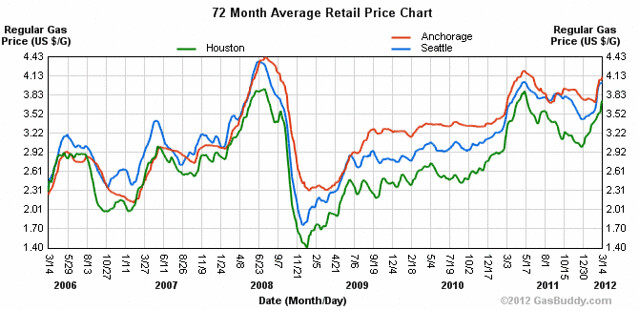Michael Giberson
As the chart below shows, during the summer of 2008 gasoline prices in Anchorage, Alaska switched from following typical prices in the lower 48 to a modest but notable amount above such typical prices. Not shown, but you can check it out at Gasbuddy.com where I generated the chart, after the summer of 2008 Anchorage prices have tracked more closely with Honolulu, Hawaii prices instead of prices in the continental United States.

We’ve discussed this before. As noted here in a post in 2009, “For years, average prices in Alaska were about the same as the U.S. average price. Higher costs of delivery in Alaska were mostly offset by the nation’s lowest gasoline tax, just 8 cents a gallon, and the result was a price that more or less tracked the U.S. average price.” More from that post:
That pattern changed beginning in June 2008. Prices had been marching up everywhere, but the price march stalled in the lower 48, while in Alaska (and Hawaii) prices continued to rise for another month. Prices fell sharply throughout the country from July through December – excepting a short pause during the late hurricane season in the lower 48 – but Alaska’s prices now seemed to track the higher prices of Hawaii rather than returning to the U.S. average.
The 2009 post reported the conclusions of an Alaskan investigation: no illegal collusion found, but oligopoly probably is minimizing competitive pressure.
Some Alaskan politicians want to do something about current, continuing, relatively high (compared to nearby Seattle) prices. A committee of the Alaskan state senate just held hearings on SB 28, an act that would declare it illegal to sell or offer to sell certain petroleum products at unconscionable prices. (More information on SB 28 here.)
From the Associated Press:
JUNEAU, Alaska — A bill aimed at gasoline refiners that would ban price gouging received a hearing Tuesday before a skeptical Senate committee.
Sen. Bill Wielechowski said his proposal is a response to the “unconscionable” disparity between the prices Alaskans pay for gas and heating fuel compared to rates elsewhere on the West Coast that have traditionally been similar. …
Under the proposal, prices could not exceed 10 percent of those charged by Seattle-based refiners. Alaska’s attorney general would be allowed to investigate claims against companies refining more than 1 million gallons of fuel per year, and companies guilty of price gouging would face a penalty equal to at least 10 times the profit gained from the practice.
Sen. Cathy Giessel, R-Anchorage, said the proposal misses its target.
She said it amounts to a “jobs bill for attorneys” by setting up an environment for constant lawsuits, and that it would drain companies providing Alaskans a much-needed product. She also said Seattle isn’t a fair comparison. Tesoro has exorbitant transportation costs to get crude oil from the North Slope and elsewhere, she said, and they also run their production facilities on cheaper fuel.
“This appears to vilify refineries by saying that they’re ‘unconscionable’ and ‘disreputable,’” Giessel said.
“Under the proposal, prices could not exceed 10 percent of those charged by Seattle-based refiners.”
A 90% discount from Seattle prices seems unreasonable. 🙂
I presume the author’s intent was: could not exceed by more than 10%.
I suspect the same. Though the sponsor deleted that part of the bill after hearing objections that something could affect Seattle and not Alaska, or affect Alaska and not Seattle, so a fixed rule could accidentally create problems.
Now the proposal is a nice soft “unconscionable,” the very opposite of a fixed rule, which obviously comes with its own problems.
Good news is that the Alaska legislature seems unlikely to pass the proposal.
This US prices compared to UK prices are still very low.